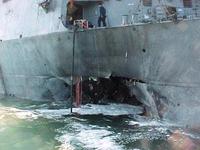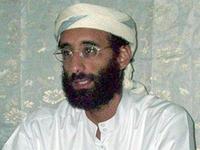-
USS Cole attack mastermind killed in drone strike in Yemen

A U.S. drone attack in Yemen kills Fahd al-Quso, 37, one of the masterminds of the 2000 USS Cold attack; al-Quso was a senior operative in Al Qaeda in the Arabian Peninsula (AQAP), and among other plots, was behind the underwear bomber’s attempt on a Delta flight to Detroit; he escaped an earlier drone attack, in 2009; the Obama administration has dramatically intensified drone attacks on terrorist targets; since Obama took office on 20 January 2009, there have been 260 attacks by Predators or Reapers in Pakistan — averaging one every four days; in addition, there have also been some three dozen drone attacks on terrorist targets in Yemen, and a few in Somalia
-
-
Protecting U.S. bridges from terrorism, accident
More than 600,000 bridges in the United States are 20-feet long or longer, some over a century old, many of them national iconic monuments; DHS, the Federal Highway Administration, and the U.S. Army Corps of Engineers are conducting a series of tests aiming to make the bridges better able to withstand a terrorist attack; this research is discovering how materials, connection details, and designs in aging bridges react to IEDs, other explosives, kinetic impact, intense fires, and other accidents
-
-
New tool offer better flooding protection
There are more than 84,000 dams across the United States, and millions of Americans live behind them; if these dams and levees were to fail and unleash catastrophic flooding, as some did in New Orleans in 2005, a high price will be paid in life lost and property destroyed; DHS S&T and partners develop new software systems for fast simulation of catastrophic flooding
-
-
Detecting suicide bombers from a safe distance
Suicide bombings have now spread to Syria; a Florida company produces equipment designed to aid in the detection of a suicide bomber at standoff distances, before a terrorist can reach his intended target
-
-
Five arrested in foiled Cleveland bridge bomb plot

Five men who considered themselves anarchists and angry at the government and corporate America were arrested after a foiled attempt to blow up a Cleveland area bridge; the five were planning on commemorating May Day, the international workers’ holiday, by destroying the bridge connecting two wealthy Cleveland suburbs
-
-
Al-Awlaki, posthumously, urges biological, chemical attacks on U.S.

In a 5-page article published in al Qaeda in Yemen’s English-language magazine, Anwar al-Awlaki, the U.S.-born jihadist who was killed last September by a missile launched from a CIA-operated drone, writes that the use of poisons of chemical and biological weapons against U.S. population centers is allowed and strongly recommended “due to the effect on the enemy”
-
-
Counterterrorism expert: democracy in Central Asia lost in translation
Democracy in post-Soviet Central Asia states failed not only because of the region’s Soviet legacy and hardships of transition, but also due to a lack of cultural competence among international, U.S., and EU agencies promoting democracy
-
-
Concerns raised about body-cavities explosives attack on aviation

Security services raised the possibility that al Qaeda affiliates may decide to mark the anniversary of the killing of Osama Bin Laden by sending suicide bombers with explosives inside their bodies to bring down airplanes; these experts point to an August 2009 attempt by a suicide body-bomber on a Saudi prince, and to the fact that U.S. drones earlier this year killed a Yemeni doctor who had devised medical procedures which could be used surgically to plant explosive devices in humans
-
-
Report: Some terrorist plots hatched by FBI
In recent years a number of terrorist attacks against the United States have been foiled by federal, state, and local authorities; a number of these plots may have been initiated by the FBI, and though they fall short of entrapment, they may well never have been developed without the FBI’s direct encouragement
-
-
German official: Lone-wolf terrorists are the greatest threat
Germany’s interior minister said that the greatest terrorist threat Germany faces is no longer the large-scale organization of the al Qaeda stripe, but the independent “lone-wolf” attacker
-
-
Tuaregs set Sahara aflame, proclaim new country

Tuareg secessionist rebels have declared independence in an area larger than France in the northern two-thirds of Mali; the move, which has been condemned by the UN and the African Union, among others, has raised concerns about similar secessionist moves in neighboring Niger, where the Tueareg-populated areas contain large deposits of uranium and active uranium-mining operations; there are also fears about the relationship between an independent Tuareg government and al Qaeda-affiliated organizations in North Africa
-
-
First U.S. drone attack in Pakistan in a month kills four terrorists
Yesterday, Sunday, missiles launched from a CIA drone missiles hit military targets in Pakistan for the first time in a month. The attack killed four al Qaeda members, but further heightening tensions between the United States and Pakistan. Back in November 2011, U.S. airstrikes, called in by Pakistani commanders n the ground, killed twenty-four Pakistani soldiers. In response, Pakistan said that unless the United States apologized for the incident, no more U.S. drone attack would be allowed against terror targets inside Pakistan. The United States expressed regrets over the death of the soldiers, but refused to apologize, saying the accident was the result of mistakes and miscommunication on both sides. Since November, the United States has reduced considerably the number of drone attacks inside Pakistan, but has refused to end such attacks altogether. The U.S. refusal has led to Pakistani parliament, on three different occasions, to pass resolutions calling upon the United States to cease and desist.
-
-
Bill in Israel would cut social security payments to terrorists in half
Lawmakers from the nationalist Yisrael Beytenu party (the leader of the party is Avigdor Lieberman, Israel’s foreign minister) have sponsored a bill, which was approved for its second and third reading in a contentious meeting of the Knesset Labor, Welfare, and Health Committee on earlier today (Monday), which would cut in half National Insurance (more or less the Israeli equivalent of the U.S. Social Security) payments to criminals convicted of terror-related crimes upon their release from prison. The legislation cuts National Insurance benefits by 50 percent for Israeli citizens involved in terrorism who were sentenced to at least ten years in prison.
-
-
British state-backed reinsurer has £4.5 billion to cover Olympic Games terror-related losses
Pool Re, the British state-backed reinsurer which covers commercial property losses from terror attack-related activities, has £4.5 billion ($7.327 billion) of assets to cover the Summer Olympic Games. Pool Re said it had no plans to jack up premiums for the event. If the damage from bombings or other terror-related incidents were to cost more than that amount, the British taxpayer, under the Pool Re structure, would step in to cover the difference. Pool Re was set up in the 1990s when the U.K. government was worried that the terror campaign pursued by Irish militant groups could make London property uninsurable and damage the national economy.
-
-
Surface-to-air missiles to protect London Olympic Games
British security sources revealed that the security envelope developed to protect the Summer Olympic Games in London will include six Rapier surface-to-air missile (SAM) batteries. The British security forces will conduct, between 2 and 10 May, a massive exercise, called Exercise Olympic Guardian, on land, sea, and in the air in the London and Weymouth areas. For those familiar with London: For the exercise, six sites were selected for deployment of the SAM dummies: the Lexington Building in Tower Hamlets; the Fred Wigg Tower in Waltham Forest, east London; Blackheath Common; Oxleas Wood, Eltham; William Girling Reservoir, Enfield; and Barn Hill in Epping Forest.
-
More headlines
The long view
How Male Grievance Fuels Radicalization and Extremist Violence
Social extremism is evolving in reach and form. While traditional racial supremacy ideologies remain, contemporary movements are now often fueled by something more personal and emotionally resonant: male grievance.
